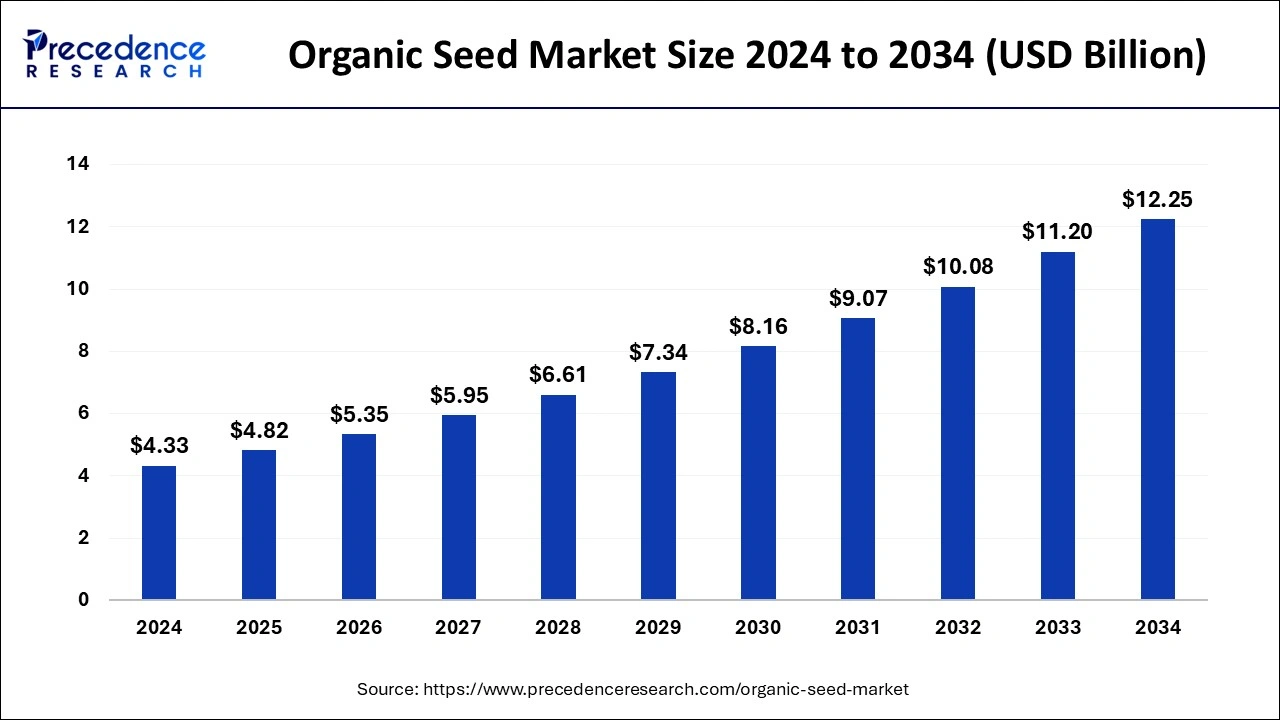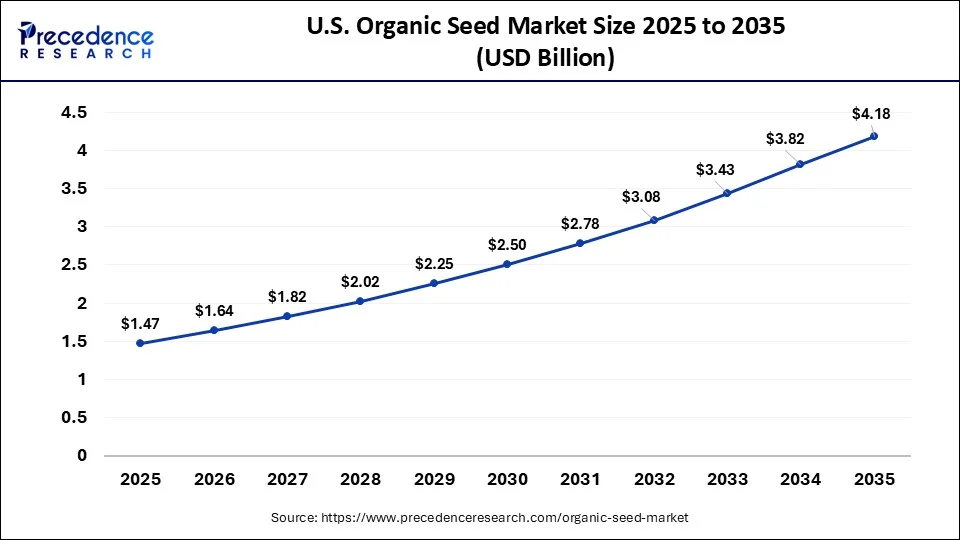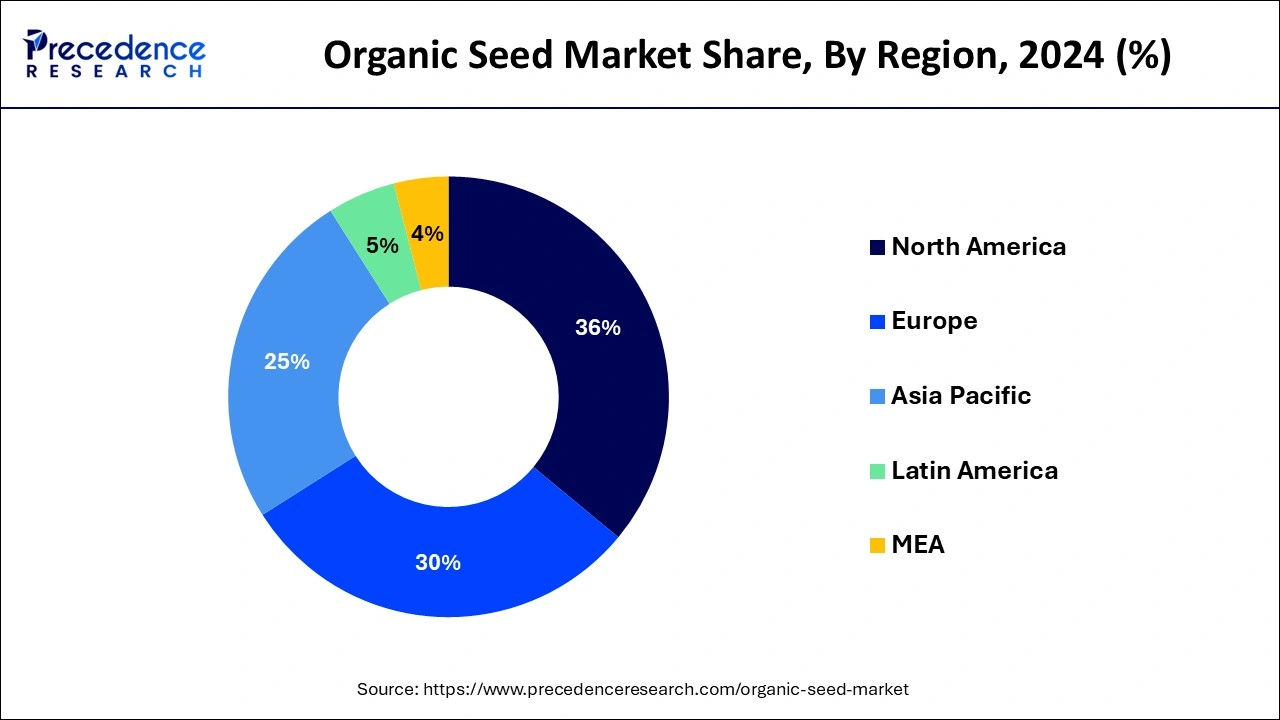What is the Organic Seed Market Size?
The global organic seed market size was estimated at USD 4.82 billion in 2025 and is predicted to increase from USD 5.35 billion in 2026 to approximately USD 13.35 billion by 2035, expanding at a CAGR of 10.72% from 2026 to 2035. People are becoming more aware of the harmful effects of synthetic chemicals used in conventional farming process. Contrary, Organic seeds, being free from such chemicals are driving the markets growth highly.

Organic Seed MarketKey Takeaways
- The global organic seed market was valued at USD 4.82billion in 2025.
- It is projected to reach USD 13.35billion by 2035.
- The organic seed market is expected to grow at a CAGR of 10.72% from 2026 to 2035.
- North America has generated highest revenue share of around 36% in 2025.
- Asia pacific is fastest growing region with highest CAGR during the forecast period in organic seed market.
- Based on a type, the vegetable seed segment held the largest market share of 33% in 2025 and dominated the market. it is further anticipated to grow exponentially in the global organic seed market.
Market Overview
The organic seed market is flourishing as more people are choosing organic products for their health and the environment. Organic seeds are non-GMO (non- genetically modified), free from synthetic chemicals, and produced through sustainable farming practices. This market encompasses a wide range of seeds, including those for fruits, vegetables, grains, and herbs. Consumer awareness about the benefits of organic foods are driving the demand for organic seeds. People are becoming more conscious of the chemicals used in conventional farming and are opting for organic options to avoid harmful residues.
The organic seed market is also influenced by the growing popularity of home gardening and urban farming. Many individuals and communities are embracing organic gardening practices, leading to increased demand and for organic seeds.
Furthermore, government support for organic farming initiatives and regulations promoting sustainable agriculture practices are contributing to the growth of the organic seed market. However, challenges such as higher prices compared to conventional seeds and the limited availability of certain varieties may hinder the market's expansion. Nonetheless, with the increasing emphasis on sustainability and health, the organic seed market is expected to continue its upward trajectory in the coming years.
Organic Seed MarketGrowth Factors
- As more consumers prioritize health and environmental sustainability, there's a growing preference for organic foods, driving demand for organic seeds.
- People are becoming more aware of the harmful effects of synthetic chemicals used in conventional farming. Organic seeds, being free from such chemicals, are seen as a healthier and safer option.
- The popularity of home gardening and urban farming is on the rise. Many individuals and communities are growing their own organic produce, leading to a higher demand for organic seeds.
- Government initiatives promoting organic farming and sustainable agriculture practices are bolstering the organic seed market. Subsidies, grants, and regulations favouring organic farming and switch to organic seeds.
- The organic agriculture sector is experiencing significant growth globally. As more farmland transitions to organic production, the demand for organic seeds increases accordingly.
- Educational campaigns and right efforts by environmental organizations and health-conscious groups are raising awareness about the benefits of organic farming and the importance of using organic seeds.
- Innovations in organic seed breeding, genetics, and production techniques are improving the quality and availability of organic seeds.
- The organic seed market is not limited by geographical boundaries. Increased globalization and trade agreements facilitate the exchange of organic seeds, creating opportunities for market expansion and diversification.
Market Scope
| Report Coverage | Details |
| Growth Rate from 2026 to 2035 | CAGR of 10.72% |
| Market Size in 2025 | USD 4.82 Billion |
| Market Size in 2026 | USD 5.35 Billion |
| Market Size by 2035 | USD 13.35 Billion |
| Largest Market | North America |
| Base Year | 2025 |
| Forecast Period | 2026 to 2035 |
| Regions Covered | North America, Europe, Asia-Pacific, Latin America, and Middle East & Africa |
Market Dynamics
Driver
Increasing consumer demand for organic products
The major driver for the organic seed market is the increasing consumer demand for organic products. As people become more health-conscious and environmentally aware, they are actively seeking out organic foods grown from organic seeds. This demand is fuelled by concerns about the harmful effects of synthetic chemicals used in conventional farming, as well as a desire for safer and more sustainable agricultural practices.
Additionally, the rising popularity of home gardening and urban farming further boosts the demand for organic seeds. As a result, farmers are transitioning to organic farming methods, governments are implementing policies to support organic agriculture, and companies are investing in research and development of organic seed varieties. Overall, the strong and growing consumer demand for organic products are the primary driver propelling the growth of the organic seed market.
Restraint
Limited availability
Organic seed production requires strict organic farming practices, which often result in lower yields compared to conventional methods. Organic farmers must rely on natural inputs for pest and weed control, leading to increased labour costs and potentially lower crop yields. Organic seed varieties are not as widely available as conventional ones. Developing organic seed varieties requires time, research, and investment in breeding programs tailored to organic farming conditions. As a result, the selection of organic seed varieties may be limited, and farmers may face challenges finding suitable options for their specific growing conditions.
Organic seed production and distribution must follow stringent certification standards set by organic certification authorities. Obtaining and maintaining organic certification includes additional costs for seed producers, which are ultimately passed on to consumers in the form of higher prices. Conventional seed production benefits from economies of scale due to larger volumes produced and distributed. Organic seed production, on the other hand, often operates on a smaller scale, leading to higher per-unit costs. Additionally, in some regions, the organic seed market faces tough competition from the conventional seed market, which may offer lower-priced alternatives. This competition can limit the growth of the organic seed market, especially among price-sensitive consumers and farmers.
Opportunity
Innovative organic seed breeding and production methods
Major future opportunity for the organic seed market lies in technological advancements and innovations in organic seed breeding and production methods. As technology continues to evolve, there's increasing potential to develop new organic seed varieties that are more resilient, productive, and adaptable to various growing conditions. Scientists and researchers are exploring methods such as precision breeding, genomic selection, and marker-assisted breeding to enhance the traits of organic seeds, such as disease resistance, drought tolerance, and nutritional content. These advancements could result in organic seeds that offer higher yields and better performance, addressing some of the current challenges associated with organic farming.
Moreover, technological innovations in organic seed production, such as automated planting and harvesting systems, can help improve efficiency and reduce labour costs for organic farmers. By harnessing technology to overcome barriers in organic seed development and production, the organic seed market can tap into new opportunities for growth and expansion in the future.
Technological Advancement
Technological advancements in the organic seed market feature AI, digitalization, blockchain, and precision breeding. Blockchain is used for tracing the entire end-to-end process of the supply chain. Digital farming solution is possible due to the popular technologies such as satellite imaging and AI. It improves crop management. Robotics and automation are used for the completion of farming tasks such as harvesting, planting, and weeding.
The precision breeding approach has advanced techniques to succeed in the development of seeds. The drones and remote sensing monitor the movements of the crop, helping farmers with useful data. The technology is a relief to the organic seed market. The awareness and adoption of new advancements will benefit the farmers.
Segment Insights
Type Insights
The vegetable seed segment held the largest market share in 2025 and dominated the market. it is further anticipated to grow exponentially in the global organic seed market. Owing to the increasing interest and awareness about fresh organic vegetables and its benefits to health, many people are inclined to grow veggies by their own in the balcony or terrace garden in both village and cities.
The vegetable seeds segment is a hug part of the organic seed market because many people want to grow their own healthy veggies without chemicals. It includes lots of different kinds of seeds for things like tomatoes, peppers, carrots, and coriander and many more vegetables can be grown by perfect tips and care. According to the human psychology, nurturing plants and staying with them for long time can affects the mental health in a positive manner and releases a chemical in the brain like serotonin and dopamine and GABA.
Companies of the organic seed market are coming up with new types of organic vegetable seeds that grow well and taste great. They make seeds that are resistant to diseases, give bigger harvests, and can grow in different climates. This helps farmers grow more food and makes it easier for people to have fresh, organic veggies all year round. So, the vegetable seeds segment is becoming significant on a global scale because it helps people grow healthy, tasty vegetables at home and on farms. As more and more people want organic veggies, this segment keeps growing, offering new types of seeds to make sure everyone can enjoy delicious, chemical-free vegetables.
According to the research, gourds and root vegetables are abundant with highly soluble and insoluble fibres. This helps in a reducing high blood, glucose level in the bloodstream, and lipid profile, eventually lead to lowering the risk of heart diseases and type 2 diabetes which now commonly found in masses world widely. As people are becoming aware about the direct relation between food we consume and its possible benefits or hazards, they are seeking more natural and organic food products including vegetables. All these factors are leading to the growth of vegetable segment in the organic seed market, and it will hold its position strongly even in the foreseen period due to its highly impactful nature on human system.
Regional Insights
What is the U.S. Organic Seed Market Size?
The U.S. organic seed market size was estimated at USD 1.47 billion in 2025 and is projected to surpass around USD 4.18 billion by 2035 at a CAGR of 11.02% from 2026 to 2035.

North America dominated the global organic seed market with a 36% revenue share in 2025. Many factors are contributed to this growth including, popularity of home gardening is rising among the people even in urban areas, awareness about healthy foods and its possible benefits on human body and productivity in life, supportive governments policies and regulations for the organic seed market. These are some of the major key drivers for fuelling the dominance of north America in organic seed market. Feild crop seed segment almost held the 50% market share as per the organic sales recorded in Canada.
Also, major key players are contributing to the growth of this segment such as, Johhny's selected seeds and southern exposure seed exchange etc. Despite of this, many of the organic farmers are still depends upon conventionally derived seeds in united states. Considering these seeds as an economical option to the organic seeds at least to some extent. Such an inclination of farmers towards conventional seeds use may hinder the markets expansion on a global level.
Currently, North America is dominating the organic seed market. North America has the largest chain of producers and distributors of organic seeds. The emerging consumer demand for organic food and advanced farming systems is replacing traditional methods with modern technology. The quick adoption of advancements has achieved developments in the farming sector.

Asia Pacific has accounted for 25% revenue share in 2025 and is the fastest-growing region with the highest CAGR during the forecast period in the organic seed market. The majority of seeds produced in developing countries like India, Japan, are imported by the developed countries such as Canada and united states. developing countries like India, China has been practising organic farming method since thousands of years. As chemically loaded soil is becoming unfruitful since past some decades, many of the regions have started to adopt an organic farming method world widely.
- For instance, the Indian government has initiated a national program for organic production to promote the organic farming and seeds. India is leading towards establishing a stronghold over the organic seed market and holds a significantly promising future in the organic seed market.
What are the Advancements in the Organic Seed Market in Europe?
Europe is expected to witness significant growth in the market throughout the forecasted years. This growth is driven by the region's stringent sustainability regulations and ethical consumer preferences. Countries like Germany, France, and the UK are leading players due to their strong organic agriculture frameworks and retailer support, which ensures traceability. Investments in organic breeding programs and seed-saving initiatives are also gaining traction, strengthening local supply chains and reducing dependency on imports.
Germany Organic Seed Market Trends: Strong regional frameworks and initiatives have encouraged the region to develop terroir-specific seeds, thus reinforcing the country's reputation for quality. The country also has supportive policies for small-scale cooperatives, fostering a diverse supplier landscape.
What are the Key Trends in the Organic Seed Market in Latin America?
Latin America is expected to witness substantial growth in the market, driven by factors like a growing middle-class population, rapid urbanization efforts, and growing interest in traditional, pesticide-free food. Regional governments are seen promoting organic farming through various national programs and subsidies, thus enhancing seed availability and quality. Domestic seed producers and startups in the region are increasingly focusing on developing locally adapted organic varieties as well.
Brazil Organic Seed Market Trends: The country's market is driven by factors like rising adoption of high-yield and genetically modified seeds, which help in expanding commercial agriculture and also increase demand for sustainable farming practices. Awareness initiatives and improved market access, including digital platforms and cooperatives, are helping small and medium farmers adopt organic seeds.
How is the Middle East and Africa Region Growing in the Organic Seed Market?
The Middle East and Africa are expected to witness steady growth in the market, driven by various new technological innovations like precision farming and genetic engineering, which have greatly enhanced seed quality and crop yields. These developments have also fostered a growing demand for GM seeds that have resistance to pests, diseases, and adverse climatic conditions. Furthermore, the increasing regional population and changing dietary preferences have propelled the market even more.
Saudi Arabia Organic Seed Market Trends: Farmers in the region are increasingly recognizing the long-term benefits of using organic seeds that promote ecological balance and reduce the reliance on chemical inputs. These advancements are fostering a more resilient, scalable, and sustainable market landscape.
Organic Seed Market Companies
- Vitalis Organic Seeds
- Seeds of Change Inc.
- Seed Savers Exchange
- Southern Exposure Seed Exchange
- Johnny's Selected Seeds
- Wild Garden Seed
Recent Developments
- In October 2024, Oregon researchers joined a first-of-its-kind national research partnership in organic seed production. The rising demand for organic seed is paving the way to expand and gain recognition by participating in the popular market trends. (Source - https://extension.oregonstate.edu)
- In September 2024, Biona launched organic super seed bread sliced loaf. The product contains high protein, oat kernels, pumpkin seeds, flax seeds, and sunflower seeds. The product will attract the health-conscious consumers and will progress in the nutrients sector. (Source - https://www.betterretailing.com)
- In June 2024, Enza Zaden officially opened its new production site in Luttelgest, Flevoland. On an eight-hectare site, they have built several facilities to produce organic vegetable seeds, focused on sweet pepper and cucumber.(Source - https://www.hortidaily.com)
- In 2023, Johnny's selected seeds launched a new product of organic seeds to expand their portfolio and this expansion is incorporated with total 42 products. The company's main agenda was to offer an improvement in organic seeds production and developing an innovative type of organic seeds. Such a step can help in strengthened their presence in the global market.
- In July 2023, Enza Zaden Global started the construction of an innovative production facility for the cultivation of Vitalis organic vegetable seeds. This new construction is developing in the Netherlands. The site is considered as hub for producing Vitalis organic seeds and selling it in the global market. this operation is expected to start in April 2024.
Segments Covered in the Report
By Type
- Field Crop Seeds
- Vegetable Seeds
- Fruit and Nut Seeds
- Others
By Region
- North America
- Europe
- Asia-Pacific
- Latin America
- Middle East and Africa
For inquiries regarding discounts, bulk purchases, or customization requests, please contact us at sales@precedenceresearch.com
Frequently Asked Questions
Tags
Ask For Sample
No cookie-cutter, only authentic analysis – take the 1st step to become a Precedence Research client
 Get a Sample
Get a Sample
 Table Of Content
Table Of Content




 sales@precedenceresearch.com
sales@precedenceresearch.com
 +1 804-441-9344
+1 804-441-9344
 Schedule a Meeting
Schedule a Meeting